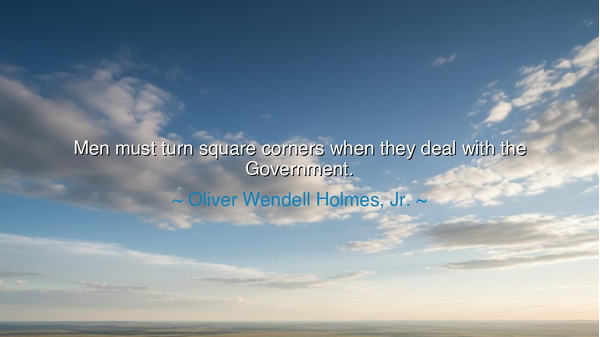
Men must turn square corners when they deal with the Government.






The great jurist Oliver Wendell Holmes, Jr., known as the “Great Dissenter” of the U.S. Supreme Court, once declared: “Men must turn square corners when they deal with the Government.” In this brief yet powerful statement, Holmes gave voice to one of the eternal truths of civilization—that when a citizen stands before the law, he must do so with integrity, precision, and respect. It is not enough to be clever or cunning; one must be honest, exact, and upright. The phrase “square corners” itself carries the symbolism of moral geometry—it is the shape of fairness, the outline of justice, the sign of straight dealing. Holmes, who had seen both war and law at their most brutal, knew that when men twist truth or bend honesty before authority, the very foundation of order begins to crumble.
At its heart, this quote speaks of responsibility before power. Holmes believed that in a world governed by law, the individual’s duty is not to outwit the system but to uphold it through sincerity and accuracy. To “turn square corners” means to act with complete transparency—to fulfill obligations as they are, not as one might prefer them to be. He recognized that the Government, as the embodiment of law and order, is not a mere adversary or competitor, but the structure through which society itself stands. Thus, when one engages with it—whether through contracts, taxes, or the courts—one must walk in the light of truth. For while the Government must be fair to its citizens, the citizen must, in turn, approach it with clean hands and a straight spine.
The origin of Holmes’s statement comes from his opinion in Rock Island, Arkansas & Louisiana Railroad Co. v. United States (1920). The case dealt with a railroad company that sought to avoid paying certain obligations owed to the federal government. Holmes, writing for the Court, refused to excuse the company’s attempt at technical manipulation. He reminded the nation that when individuals or corporations deal with the state, they cannot cut corners or hide behind legal tricks. His words were not born of arrogance but of principle. As a Civil War veteran who had seen the blood cost of anarchy, Holmes understood that order depends on honesty, and that the rule of law is a sacred covenant between government and governed—each bound to act with integrity.
Throughout history, this principle has been tested and reaffirmed. Consider the tragic fall of Enron in the early 2000s—a modern parable of what happens when men refuse to turn square corners. The executives of that company, through deceitful accounting and manipulation of financial rules, sought to enrich themselves while defrauding the public and the government. For a time, their cunning brought them glory, but eventually truth, like a storm long gathering on the horizon, broke through. Their empire collapsed, thousands lost their livelihoods, and justice demanded its due. Holmes’s words echo through that tale: those who deal dishonestly with the law may prosper for a season, but they build their houses upon sand.
Yet, Holmes’s wisdom carries a deeper moral resonance beyond mere legality. To “turn square corners” is also a call to personal integrity—to live one’s life without deceit or evasion. It reminds us that justice is not only found in the courtroom but in the daily dealings of ordinary people: the contracts we sign, the promises we make, the truth we tell. The Government may be vast, but it is made up of individuals who must each hold themselves to the same standard. When citizens act with honesty, the Government reflects that virtue; when they act with cunning, the Government becomes a mirror of corruption. Thus, the character of a nation is born not from its laws alone, but from the straightness of its people’s hearts.
But Holmes’s teaching also carries a warning—a subtle recognition of imbalance. He implied that while men must turn square corners with the Government, the Government must also act with fairness toward them. The law, to be respected, must itself be just. If the Government wields power arbitrarily or without mercy, it becomes not the guardian but the oppressor. Holmes’s wisdom, therefore, invites mutual respect: the citizen must act with rectitude, and the state must govern with conscience. Each sustains the other. A nation in which one side abandons this moral geometry soon loses the symmetry of justice.
The lesson we draw from Holmes’s words is eternal: honesty is the foundation of freedom. A society cannot remain free when its people seek to evade their duties, nor when its rulers twist the law for their own gain. To “turn square corners” is not an act of submission, but of dignity. It is the discipline of those who understand that truth, though sometimes burdensome, is the only path that keeps civilization from descending into chaos.
So let us remember Holmes’s counsel in our dealings great and small. When we face the laws of our land, let us walk straight, neither cutting corners nor hiding shadows. When we make promises, let them be clear and true. For nations endure not through cleverness but through character. The man who turns square corners stands not only within the law but within the eternal order of justice itself—and in that alignment, he becomes a guardian of the peace and stability upon which all liberty depends.






AAdministratorAdministrator
Welcome, honored guests. Please leave a comment, we will respond soon